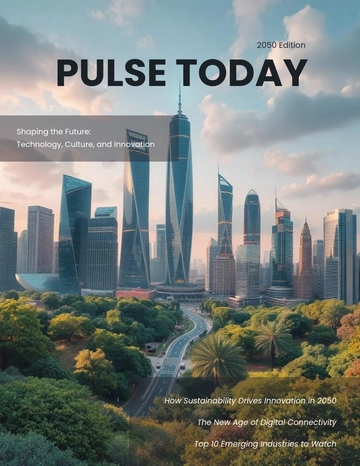Free Panel Discussion in Magazine Article

Title: Panel Discussion: The Future of Remote Work
Written by: [Your Name]
Publication Date: [Date]
I. Introduction

As the landscape of work continues to evolve, remote work has emerged as a pivotal topic of discussion. With advancements in technology and changing attitudes toward work-life balance, many organizations are rethinking their approach to remote and hybrid work models. In this panel discussion, we explore the future of remote work, the challenges and opportunities it presents, and what the future holds for employees and employers alike.
II. Panelist Introductions
Dr. Emily Carter - Remote Work Specialist and Author of "The New Workplace Revolution" Dr. Carter is an expert in remote work strategies and has spent over a decade researching how remote work impacts productivity and employee satisfaction.
Alex Johnson - CEO of Tech Innovate Solutions Alex Johnson leads a tech company that has successfully implemented a hybrid work model. He brings practical insights on balancing remote and in-office work.
Maria Gomez - HR Director at Global Corp Maria Gomez oversees employee relations and has implemented various remote work policies within her organization. Her experience includes managing remote teams and maintaining company culture.
David Lee - Freelance Graphic Designer and Remote Work Advocate David Lee has been working remotely for over five years and advocates for the benefits of freelancing and flexible work arrangements.
III. Discussion
Moderator: Welcome, everyone. To start, what do you think are the biggest benefits of remote work for both employees and employers?
Dr. Carter: From an employee perspective, remote work offers flexibility, which can lead to increased job satisfaction and better work-life balance. For employers, it can mean access to a wider talent pool and potential cost savings on office space.
Alex Johnson: I agree. At Tech Innovate Solutions, we've found that remote work has significantly boosted employee morale and productivity. However, it's crucial to maintain strong communication channels to ensure team cohesion.
Maria Gomez: Yes, communication is key. Implementing remote work requires robust tools and practices to keep everyone connected and engaged. It's also important to have clear policies and support systems in place to address any challenges that arise.
David Lee: As a freelancer, I appreciate the autonomy that remote work provides. It allows me to manage my own schedule and work in a way that suits my personal productivity rhythms. However, it's also essential to stay disciplined and avoid isolation.
Moderator: What are some common challenges that organizations face when transitioning to remote work, and how can they overcome them?
Dr. Carter: One major challenge is maintaining a sense of community and company culture. Regular virtual meetings and team-building activities can help address this issue. Additionally, investing in technology that supports remote collaboration is vital.
Alex Johnson: Another challenge is managing performance and productivity. Clear goals, regular check-ins, and performance metrics can help ensure that remote employees remain productive and aligned with company objectives.
Maria Gomez: Ensuring data security is also a concern. Organizations need to implement strong cybersecurity measures and provide training to employees on best practices for handling sensitive information.
David Lee: For freelancers, managing boundaries between work and personal life can be tricky. Setting up a dedicated workspace and establishing a routine can help maintain a healthy work-life balance.
IV. Conclusion
The future of remote work presents both opportunities and challenges. As technology continues to advance and work preferences evolve, organizations must adapt their strategies to support remote and hybrid work models effectively. By addressing communication, performance, and security concerns, employers can create a productive and engaging remote work environment.
V. Call to Action or Further Reading
To explore more about remote work best practices and strategies, check out Dr. Emily Carter’s book, "The New Workplace Revolution." For practical tips on managing remote teams, visit Tech Innovate Solutions’ blog. Additionally, you can find resources and tools for remote work at Global Corp’s website and connect with freelance communities to share experiences and advice.
- 100% Customizable, free editor
- Access 1 Million+ Templates, photo’s & graphics
- Download or share as a template
- Click and replace photos, graphics, text, backgrounds
- Resize, crop, AI write & more
- Access advanced editor
Introducing Template.net’s Panel Discussion in Magazine Article Template is fully customizable and editable to showcase diverse viewpoints effectively. Editable in our AI Editor Tool, this template allows you to format content for engaging panel discussions. Perfect for presenting expert insights, it provides a professional layout that enhances readability and makes your articles stand out in any publication.
You may also like
- Creative Magazine
- Magazine Design
- Photography Magazine
- Wedding Magazine
- Travel Magazine
- School Magazine Ad
- Business Magazine
- Fashion Magazine
- Sports Magazine
- Lifestyle Magazine
- Health Magazine
- Church Magazine
- Photographer Magazine
- Student Magazine
- Product Magazine
- Food Magazine
- News Magazine
- College Magazine
- Music Magazine
- Architecture Magazine
- Vintage Magazine
- Art Magazine
- Small Business Magazine
- Entertainment Magazine
- Technology Magazine
- Blogger Magazine
- Science Magazine
- Corporate Magazine
- Kids Magazine
- Fitness Magazine
- Automotive Magazine
- Political Magazine
- Project Magazine
- Cooking Magazine
- Game Magazine
- Movie Magazine





























